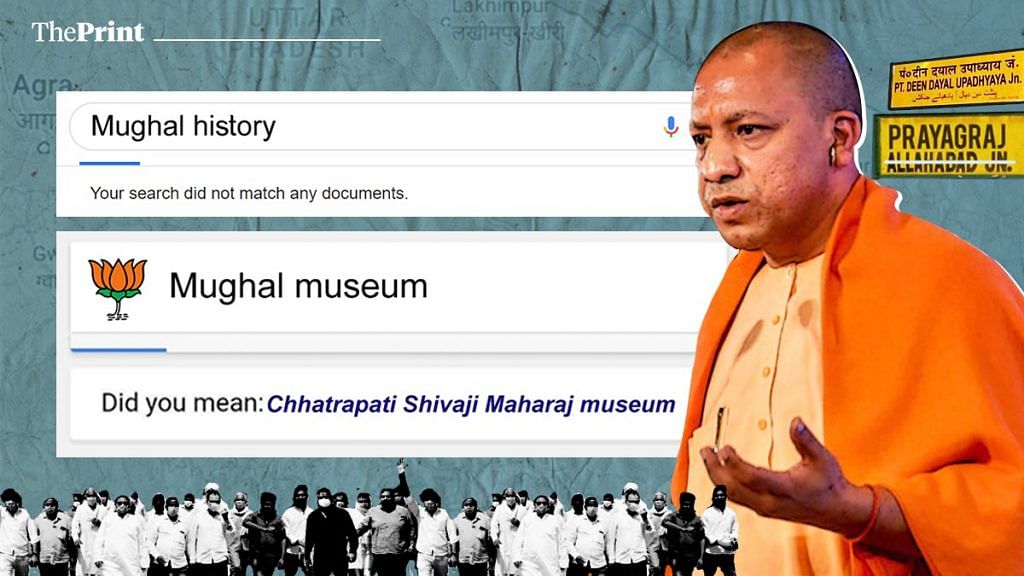After renaming Allahabad to Prayagraj, Faizabad to Ayodhya, Mughalsarai Junction to Pandit Deen Dayal Upadhyaya Junction, and then, Agra Airport to Pandit Deen Dayal Upadhyaya Airport, Uttar Pradesh Chief Minister Yogi Adityanath has found a new ‘target’. Driven by a compulsive need to rename ‘Muslim-sounding places’ to something that sounds more ‘Hindu’, Adityanath set his eyes on an under-construction Mughal museum in Agra that was envisioned by his predecessor Akhilesh Yadav.
This has very little to do with either history or Yogi Adityanath’s understanding of it. Being anti-Mughal in today’s politics is a dog-whistle and euphemism for anti-Muslim sentiment.
But obviously, the hate for Mughals is deeply rooted in Yogi’s “Babur ki Aulad” politics, which evidently needs to be upped, now that the UP assembly election is less than two years away.
Agra’s Mughal museum, now proposed to be turned into Chhatrapati Shivaji Maharaj museum, is just another example showcasing how Adityanath doesn’t consider Mughals as part of Indian history. It is ironic because Mughal history is deeply rooted in his state — for over 90 years, Agra was the capital city of Mughals, from 1560 to 1650.
The problem is convenient political conflating of Muslim invaders with settled Mughal rule. Perhaps, the greatest development feat of the Bharatiya Janata Party (BJP) is to have the Ram Mandir built in their tenure. And Adityanath continues to ride the same wave of saffron politics, by insisting that nothing ‘Mughal’ can be celebrated in his state because they are a symbol of “the mentality of slavery”. But how true is that?
Also read: Akhilesh Yadav’s politics has fallen silent. ‘UP ka ladka’ must hit the headlines
Mughals and the BJP
We can continue to malign the Mughals over the Jizya tax — how they levied it on Hindus for providing protection to them in their own land. However, this tax was abolished, reinstated and abolished again, under different Mughal rulers based on their politics, just like today, where different politicians choose to do away or keep the ‘symbols’ that suit their politics. While Akbar abolished Jizya, Aurangzeb reinstated it. However, Jahandar Shah abolished it again.
Power play has largely remained unchanged, and today’s politicians are no different from the Mughal kings 400 years ago. They broke temples then. They break mosques today. They imposed taxes then to make citizens appear like non-citizens. They impose discriminatory legislation, such as National Register of Citizens (NRC) and Citizenship Amendment Act (CAA). In this politics of historical revenge, they’re two sides of the same coin. Development and governance takes a toll.
While Aurangzeb is criticised for reinstating the Jizya, on reading the order, one can see that exemption was provided to various classes, including the unemployed, ill or old. The exemption also extended to women and children and those who joined the army. The tax was not uniform either. The wealthiest — those who owned more than ten thousand dirhams — were taxed the most (48 dirhams a year). The poorest, who owned less than 200 dirhams, had to pay one dirham a month. It’s not that only the Hindus were taxed during the Mughal period. Muslims were taxed too. The tax on Muslims was called zakat.
But today, in the golden age of BJP in India, facts don’t matter. Here, the victimisation of Hindus, 400 years ago, is repeatedly roused to evoke the pride of the community so that they re-elect a Hindu Hriday Samrat who can re-instate their self-esteem by painting India and its history in deep hues of saffron. Lessons are not learnt from history, which shows that a government — monarchy or democracy — functions best when secularism and equality are maintained, much like Akbar’s reign.
In fact, the whole idea of looking at the 331 years of Mughal rule with an anti-Hindu prism shows how the lack of education can gravely hinder one’s ability to understand history for what it was. The BJP has always held deep hatred for Aurangzeb. Even if they want to discard all symbols related to him, what about Akbar, Jahangir, Shah Jahan and those Mughal rulers who were not only deeply pro-Hindu, much to the dislike of many ulemas of their times, but also gave India some of the greatest cultural gems — the Taj Mahal, Fatehpur Sikri, Red Fort, et al, which fill the coffers of BJP-ruled states.
Also read: Priyanka’s support to Kafeel Khan part of larger strategy to tap into ‘distanced’ UP Muslims
Mughals aren’t harming the economy
Although his compulsive disorder of renaming places seems most likely permanent, the BJP high command should tell Yogi Adityanath to take his attention off Mughals and focus on helping the migrant labourers get back their livelihoods. The UP chief minister had received much praise for bringing labourers and students back home.
Yogi needs to focus on his state, which needs to tide over chronic unemployment and a crippling economy.
Renaming Mughal museum to Chhatrapati Shivaji Maharaj museum — a king who only came to Agra once, and was held captive — will turn into a parody of a museum. If you don’t know your history, don’t play with it. Even if it is to win elections. History will come back to bite you. And it just did with the Jats of UP now getting angry over renaming the Agra museum after Shivaji. They claim that it was the Jat king Surajmal who fought and defeated the Mughals in the UP region and so the museum should have his name. Adityanath now has a new problem in his hands.
The author is a political observer and writer. Views are personal.
